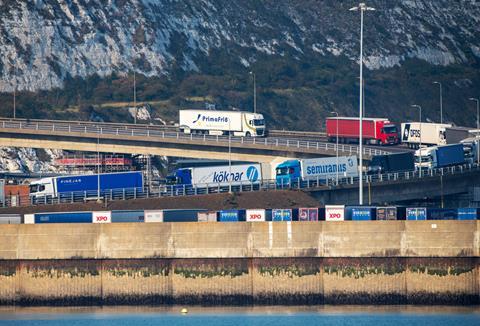Long delays could lead to product and contract inflation, says Jack Pringle

The border crisis could lead to project costs rising sharply if the situation is not resolved swiftly, a senior architect has warned.
If building products remain caught up in the chaos after the Christmas slow-down, projects will be delayed and eventually prices would go up, said Jack Pringle, former RIBA president and co-founder of Pringle Brandon, now part of Perkins & Will.
But he also cautioned that, compared with Brexit, it was a temporary hitch and not a major cause for concern for architects.
“It will definitely have an impact – on contracts and supplies – but hopefully it’s only a short-term issue,” he said. “But if delays continued we would not only see disruption but inflation too.
“However Brexit is much more important than this temporary problem with the ports,” added Pringle who left Perkins & Will in September and announced plans to set up a new practice next year. “If we get a deal that puts tariffs on building materials on a permanent basis it’s going to cause inflation in the long term and problems with deliveries in the short term as people get their head round all the forms they have to fill in.”

The UK was caught off-guard when France shut its border with the UK for 48 hours last night in an attempt to contain a new, more contagious strain of covid-19. EU member states are currently meeting to discuss a coordinated response and the prime minister is set to hold a press conference this afternoon after Cobra meets.
The freight ban means no lorries have been able to sail from Dover to pick up materials, while Eurotunnel said travel from the UK to France had also been suspended – although the route was still open in the opposite direction. Unaccompanied freight, such as containers or lorry trailers on their own, is still able to be transported into the UK.
The French government said it was trying to establish a protocol to ensure movement from the UK could resume safely in the next few hours.
Flights from the UK have also been suspended by more than 30 countries including Germany, Italy, Belgium, Poland, India, Canada, Switzerland and Hong Kong over fears of the new strain of covid-19.
The crisis comes after the UK government put around 18 million people in London and the South East under stricter tier 4 lockdown rules on Saturday night following the emergence of the new variant.
The LSE, MIT and Columbia academic Richard Sennett, a UN advisor on cities and climate change and the author of Together, Building and Dwelling and The Craftsman, tweeted:
Brits: this moment of Covid shows the flip side "taking back control of our borders." Other people take control of theirs. Sovereignty = isolation.
— Richard Sennett (@richardsennett) December 21, 2020
Construction Products Association economics director Noble Francis said delays at the border could exacerbate issues which had been building before the new restrictions were announced.
He said: “Demand already exceeds supply for some imported products such as steel, timber, roofing products and white goods, given the sharp recovery in some areas of construction since the initial lockdown, so there has been little stockpiling and any further delays could mean an increase in costs and pushing out of lead times.”
Civil Engineering Contractors Association chief executive Alasdair Reisner warned that infrastructure works being carried out over the Christmas period “could be affected if there were to be supply chain disruptions”.
But Francis added the late December slowdown in site activity could mean that major problems for construction would not be seen “immediately”, with those industries relying on just-in-time imports such as supermarkets and car manufacturers more likely to be affected.
“The largest impacts are at ports dealing with the most lorry traffic rather than shipping containers, which are ports on the South Coast, primarily Dover. Most construction products arrive in the UK on the East coast and tend to be less reliant on lorry traffic from the EU,” he said.
Cenkos analyst Kevin Cammack added: “It’s lucky that the building trade basically shuts down for two weeks over Christmas giving a chance for some backlogs to potentially unwind and any transactional issues to be resolved.”
















No comments yet